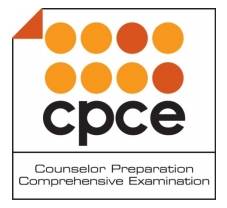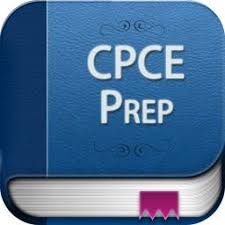Counselor Preparation Comprehensive Examination (CPCE)
Welcome to the Counselor Preparation Comprehensive Examination website for Professional Counseling Program students at Texas State University!

This website is intended to help Texas State University Professional Counseling students navigate the sometimes intimidating process of planning for, applying for, and taking the required comprehensive exam. If you have additional questions after reading all the information on this website, please reach out to Dr. Maria Haiyasoso, the TXST CPCE coordinator, at mh1423@txstate.edu.
Some Basic Information:
- Texas State University's Graduate College requires that all master's level students pass a comprehensive examination. The Professional Counseling Program uses the Counselor Preparation Comprehensive Examination (CPCE), a national examination developed and provided through the Center for Credentialing and Education (CCE).
- Students are recommended to meet with their faculty advisor early in the program to begin planning for taking the CPCE. Many students prefer to take the CPCE during or immediately before the semester in which they are enrolled in an Intermediate Methods course.
- Students must pass the exam in order to proceed to COUN 5689 Clinical Practicum
- All notifications regarding CPCE-related deadlines, changes in procedure, etc. will be sent via the Professional Counseling Program listserve. Learn how to sign up by reading the Student Handbook
- Students take the exam off-campus at a Pearson-VUE testing center.
- Failure to meet deadlines listed on this page may delay a student's progress in the program.
- The purpose of the exam is to assess student knowledge of counseling to ensure minimum competence before proceeding to Clinical Practicum. The CPCE will also provide collective feedback that can be used by the program in developing/adapting curriculum.
- The Graduate College policy that students be enrolled in at least one credit hour of coursework when taking the exam does not apply to Professional Counseling students. The Graduate College Dean has granted Professional Counseling students an exemption to the policy because students still have required courses left to take (COUN 5689 and 5389) in order to complete the degree.
Disclaimer: This website ONLY applies to Texas State University students. If you are a student at another university, please contact your school's CPCE coordinator.
-
Application and Payment Information
-
Procedures for Applying for the CPCE
Applying for the CPCE is a multi-step process. Complying with all dates posted in the Testing and Application Dates section is necessary to avoid a delay in your progress through the program.
- Students take all or most of the courses in the required content areas (see About the CPCE Exam → Content Areas below). NOTE: If a student still needs to take more than one course in the required content areas (including being registered for courses covered by the CPCE during the semester in which they intend to take the CPCE), they will need advisor approval before the program application is approved
- CPCE Campus Coordinator notifies students (via the Professional Counseling Program listserve) when the application window has opened
- Student completes CPCE Program Application (below) by posted deadline
- Program application closes and CPCE Coordinator sends e-mail confirming eligibility to take exam and how to register with CCE
- Student registers with CCE (CBT in-person version on OnVUE online version)
- Student receives e-mail from CCE with candidate ID number and instructions for registering with PearsonVue
- Student registers with PearsonVue and schedules exam at off-campus PearsonVue testing center of their choice or online via OnVUE* (Student may ONLY test within the applicable month noted in Testing and Application Dates section below)
- Student arrives at testing location (CBT version) or logs in from home (OnVUE version) on the day of the test with required identification
*Accommodations cannot be applied to the online version of the test
-
Testing and Application Dates
Month CPCE is Offered Program Application Available Program Application Due CPCE Must by Completed Before/On: EARLIEST Semester Eligible for Practicum August 2025 April 1 - June 2, 2025 June 2, 2025 August 31, 2025 Spring 2026 January 2026 Aug 1 - Nov 1, 2025 Nov 1, 2025 January 31, 2026 Summer 2026 April 2026 Jan 1 - Feb 16, 2026 Feb 16, 2026 April 30, 2026 Fall 2026 August 2026 April 1 - June 1, 2026 June 1, 2026 August 31, 2026 Spring 2027 Example: If you test in April, the earliest you will be able to take Practicum is the subsequent fall semester. This policy is not flexible and exists to enable timely release of the schedule of courses each semester.
-
CPCE Program Application
The CPCE program application should only be completed during the application dates listed in the Testing and Application Dates section for the corresponding testing semester. Completing this application will indicate your intent to test during the upcoming testing cycle. Upon the registration window closing, you will be notified of your eligibility to move forward and register for the exam through the Center for Credentialing and Education.
Here is the link to the program application:
►► CPCE Program Application (TXST Students ONLY)
(Applications only accepted during the application window listed above)
* Students in the Professional Counseling Program at Texas State University are the only ones who can register for the CPCE through this website. Students from other universities should contact their own counseling program for approved testing centers.
-
Fees and Reschedule Policy
The total exam fee is $150.
If a student needs to cancel or reschedule the CPCE exam for any reason, the fee paid to CCE/PearsonVUE may be applied to a rescheduled exam within a 6-month window. After that 6-month window, the examinee will have to pay CCE/PearsonVUE for a new CPCE administration.
If a student takes a CPCE exam and does not pass, the student will have to pay for subsequent exam(s).
-
Accommodations
Students who qualify for accommodations are strongly encouraged to use them for the comprehensive exam.
If you qualify for accommodations, first obtain a letter from the Office of Disability Services (ODS) that states your accommodations for a national standardized test. You will submit this letter as part of the TXST application process. If you are unable to obtain your letter before the application deadline, you may email it to the CPCE campus coordinator as soon as you receive it.
If you are requesting accommodations for the CPCE, you will need to pay for and schedule your exam by phone to ensure that the location you are taking the exam is equipped to provide your accommodations. Accommodations cannot be applied to online testing, so you will need to choose the CBT option. Please visit the Student FAQ section of the CCE website for the most up-to-date phone number.
Tip: If you are unhappy with the dates available when you call and you are willing to drive to another city, you may be able to ask the representative to extend the search radius to find more testing sites equipped to provide your accommodations.
-
-
Scoring of the CPCE
-
Passing Criteria
For Texas State students, a passing score of the CPCE is defined as 0.5 standard deviations above the national mean for each version of the CPCE.
Score calculation: For each version of the test, the CPCE coordinator will calculate the "pass" score by adding one half of the standard deviation for the national sample to the mean for the national sample. If this number is a fraction, they will round down to the whole number.
Example: If the national mean is 89 with a standard deviation of 9.0, the score that is half a standard deviation above the mean would be 93.5 (i.e., 89 + 4.50). Thus, the cut-off score in this example would be 93. Note: This is an example for illustrative purposes only. The passing score can change for each version of the assessment.
Past Pass Scores: In the past, pass scores have ranged from 87-96.
Why Standard Deviation? We base our pass score on standard deviation so that we are comparing our students scores against the national average rather than a set score. This means that if a test is generally harder (determined by lower scores across the country) the pass score requires a lower number of question to be correct. If the test is generally easier (determined by higher scores across the country) the pass score is a higher number. Here is an explanatory example: If we cloned someone so that we had two people who had exactly the same kind of preparation and knowledge, we could give those people two different versions of the test. If the national average was 91 for Version A and 95 for Version B, and Clone A scored a 91 on Version A and Clone B scored 95 on Version B, then each of the clones would experience their test as exactly the same level of difficulty as the other because they both scored exactly the same distance from the national average (in this case no distance).
-
Notification of Pass/Fail Score
The Texas State CPCE coordinator (Dr. Haiyasoso) will notify students of whether they have passed the exam 1 to 1.5 months after they take the exam.
Why does it take so long? Students will receive their raw scores immediately after taking the exam. The CPCE coordinator for Texas State University will receive the national norms for each version from CCE around the 20th day of the following month. They will then calculate the passing score and notify each test-taker of whether they have passed or failed the exam.
After notifying the student, Dr. Haiyasoso will submit the results to the Graduate College on the Master's Comprehensive Examination Report Form. Processing of the form by the Grad College will be done in that same semester. Students are not responsible for submitting this form.
-
Next Steps after Passing the Exam
Two months after notification of a passing score on the exam, students should check their degree audit to ensure the "pass" has been recorded. The "pass" must be indicated on the degree audit before a student applies for graduation.
-
Next Steps After Failing the Exam
Students who fail the exam will need to re-apply for another administration using the program application. Completing this application notifies the CPCE coordinator of the student's intent to re-take the CPCE. Students may NOT re-schedule a CPCE exam through Pearson-VUE without completing the program's application and receiving approval from the CPCE coordinator.
Students who fail the CPCE after the first attempt will need to set up an appointment with their faculty advisor to develop a study plan prior to completing the program's application for a second administration.
Students who fail the CPCE after the second attempt will meet with a Program Standards Committee (PSC) to discuss additional needs and support.
Upon the third failed attempt and based on PSC member recommendations, students are not allowed to register for additional classes and are not allowed further attempts at the comprehensive exam (refer to Student Handbook for more information).
-
Pass Rates
Of the students who completed their comprehensive exam process between August 2019 and April 2021:
90% of students passed the first time
96% of students passed the second time
98% of students passed the third time
-
-
About the CPCE Exam
-
Format
The CPCE consists of 160 total items with 20 items per CACREP area. Of the 20 items per section, 17 will be scored, with the remaining 3 serving as pretest items. The purpose of imbedded pre-test items is to generate actual score performance data on items for future use or deletion. This allows CCE to select items for future test construction that have the most desirable psychometric attributes. Scores for each section and a total score will be reported to institutions for each student. The CCE will provide statistics on the program's students as well as national data.
-
CPCE Content Areas
The CPCE covers the Content Areas listed below. The CPCE should be taken as soon as the following courses are completed and prior to applying for Practicum. It is strongly recommended, but not required, that you complete coursework in the CPCE Content Areas before taking the exam.
CPCE Content Areas
Courses Content Area Definitions
Human Growth and Development COUN 5368 - Developmental Issues Studies that provide an understanding of the nature and needs of individuals at all developmental levels.
Social and Cultural Foundations
COUN 5301 - Professional Counseling Orientation Studies that provide an understanding of issues and trends in a multicultural and diverse society.
COUN 5328 - Professional Orientation School Counseling COUN 5316 - Counseling Diverse Populations Helping Relationships COUN 5307 - Theories of Counseling and Personality
Studies that provide an understanding of counseling and consultation processes.
COUN 5354 - Basic Techniques in Counseling Group Work COUN 5358 - Dynamics and Processes in Group Counseling Studies that provide an understanding of group development, dynamics, counseling theories, group counseling methods and skills, and other group work approaches.
Career and Lifestyle Development COUN 5355 - Career Counseling Studies that provide an understanding of career development and related life factors. Assessment COUN 5305 - Assessment in Counseling Studies that provide an understanding of individual and group approaches to assessment and evaluation. Research and Program Evaluation COUN 5391 - Research Seminar Studies that provide an understanding of types of research methods, basic statistics, and ethical and legal considerations in research. Professional Orientation & Ethics COUN 5350 - Advanced Counselor Ethics Studies that provide an understanding of all aspects of professional functioning including history, roles, organizational structures, ethics, standards, and credentialing. -
Why the TXST Professional Counseling Program uses the CPCE
The CPCE was selected because it evaluates the eight CACREP core content areas and is a national standardized examination. In addition, the CPCE:
- Allows Master’s level comprehensive exams to better meet psychometric standards.
- Gives programs an objective view of the knowledge level of their students.
- Allows programs to examine student functioning in various curricular areas.
- Promotes longitudinal self-study.
- Compares a program’s results to national data.
- Stimulates student integration of knowledge learned in separate courses.
- Gives students comparative strength / weakness feedback.
-
Development of the CPCE
 The CPCE is researched, developed, and distributed nationally by both the Research and Assessment Corporation for Counseling (RACC) and the Center for Credentialing and Education (CCE), two affiliate corporations of the National Board for Certified Counselors (NBCC). The item writing committee was selected from master’s and doctoral level professionals. The committee compiled a comprehensive listing of texts used in counselor education programs. Each question was developed based on information found in the most commonly used textbooks.
The CPCE is researched, developed, and distributed nationally by both the Research and Assessment Corporation for Counseling (RACC) and the Center for Credentialing and Education (CCE), two affiliate corporations of the National Board for Certified Counselors (NBCC). The item writing committee was selected from master’s and doctoral level professionals. The committee compiled a comprehensive listing of texts used in counselor education programs. Each question was developed based on information found in the most commonly used textbooks. -
The CPCE VS. Licensure Exams
Please note CPCE is NOT a licensure exam. If you would like more information about the licensure exams you can find out more for each license:
- Licensed Professional Counselor: National Counselor Exam
- Licensed Marriage and Family Therapist: Examination in Marriage and Family Therapy
-
CPCE Study Resources

Students should begin to study for the CPCE by participating in classes and studying class notes. Students can also use a study guide for the National Counselor Exam (NCE) to study for the CPCE. It is recommended that students begin reviewing their course materials and studying for the exam at least two months before they plan to take the exam. Here are additional CPCE resources:
Study Group Interest Sign-up

Students have expressed interest in forming study groups to study for the CPCE and NCE exams. Completion of this form will indicate your interest in being part of a study group and your permission to share the information on the form with other students who have also completed the form. It will be up to those who have signed up for study groups to follow up with each other to create their own study groups.
The deadline to sign up is the same as the deadline to register for the CPCE. Information will be sent out after this date to all who signed up.
If you have read each section on this website and still have questions about the comprehensive exam, please contact the CPCE/NCE Campus Coordinator.